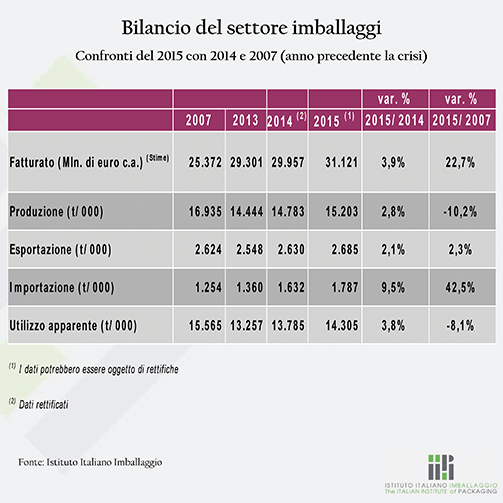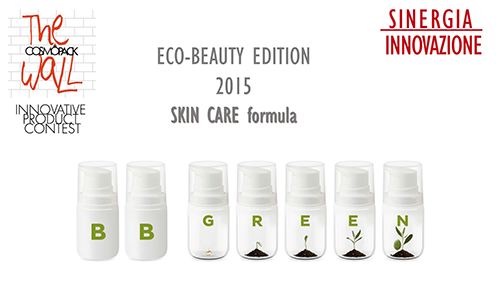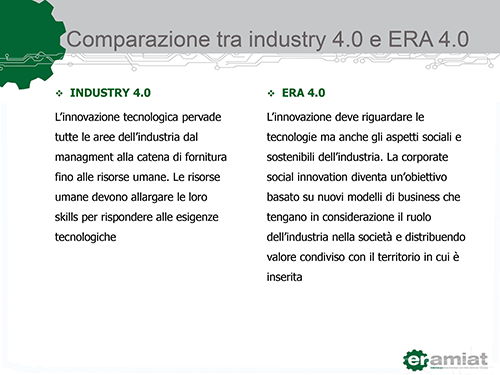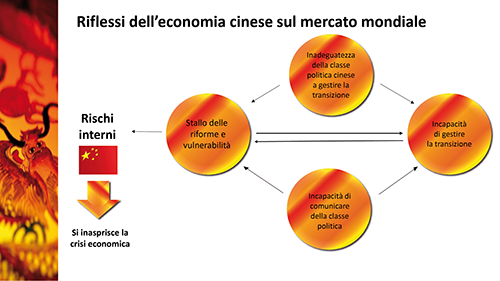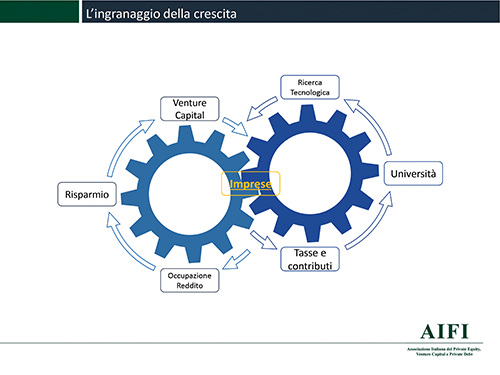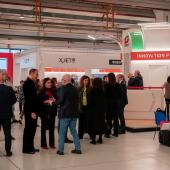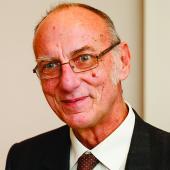Now you may tell him your reasons...
Now you may tell him your reasons / As he seems to me a just and wise man*
Evaluation of the Economic Packaging Conference, organized by Istituto Italiano Imballaggio in cooperation with Conai in May.
Editorial by Stefano Lavorini
* Luigi Pulci, Poet (Florence 1432 - Padua 1484)
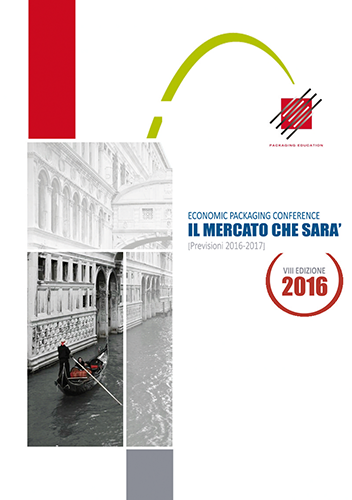 An unstructured encounter. This can be clearly understood by the diversity of the topics covered, but what is perhaps most difficult to grasp is the meaning and the value given by the interaction between speakers and participants, in general by the people among them: company managers and representatives of industry associations, established industrialists and young business owners, academics, journalists.
An unstructured encounter. This can be clearly understood by the diversity of the topics covered, but what is perhaps most difficult to grasp is the meaning and the value given by the interaction between speakers and participants, in general by the people among them: company managers and representatives of industry associations, established industrialists and young business owners, academics, journalists.
This the evaluation of the Economic Packaging Conference, organized by the Istituto Italiano Imballaggio in collaboration with Conai, held in Venice on 11 and 12 May 2016.
The "Market to be", the title of the eighth edition of the Economic Packaging Conference, moderated once again by Marco Lo Conte (Plus Il Sole 24 Ore), was in itself evocative of many questions, which we could evoke with locutions like predict, guess, foresee, read the future, rounded off by a corollary of uncertainties and hopes associated to anything we are not given to know. A matter more for fortune tellers, poets and philosophers, rather than normal people facing difficulties "on the fly".
Yet it was a philosopher the ranking of Edgar Morin who wrote: "The first difficulty in conceiving the future lies in conceiving the present."
And so, the Venetian encounter started from the here and now, confirming, as tradition has it, its role as a kind of particle accelerator that leads to a "clash" of different world experiences and views.
These even very distant, but with packaging as the common denominator, seen in its role as a daily commitment
Accompanied by unreal atmosphere of Venice that for centuries has drawn its identity from its uniqueness, its splendor and its decline, those who participated experienced a desire to supersede roles and beliefs, in a dynamic that led to confuse high and low, mix rationality and emotions.
Says Alessandro Mendini, the designer who invented the Proust armchair: "To achieve something interesting we have to look towards an unreachable objective. One needs sensitivity for the far-off to reach the nearby".
Nice concept, a pity that it clashes with the urgent needs and anxieties of everyday life, that leave you gasping for breath and which require at least an occasional respite: A bit of rest, to take your mind off those clever things you ought to be doing.
Sacrosanct, one might add, without forgetting however that we are all architects of our own choices, of the scale of priorities we have set up for ourselves.
Hence each to their own. ... content.
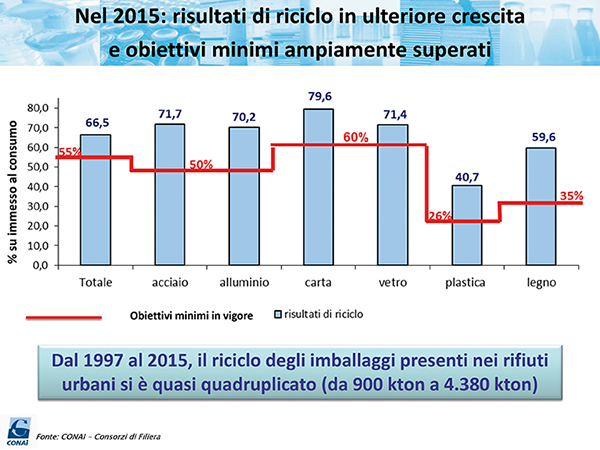 click to zoom the image
click to zoom the image
Packaging, mon ami
Some good news to start off with: the packaging industry in Italy continues to grow, not only in terms of production and turnover, but also with regard to recovery and recycling activities, proposing in this way as an example, albeit in the making, of circular economy.
As the head of the CONAI study center prevention section Simona Fontana reminded us: in 2015 packaging placed on the market for consumption is estimated to have increased (12 mln/t, + 1.7%), but even more so the segregated packaging waste managed (3.8 mln/t, + 4.6%), the the waste packaging recovered, equal to 77.5% of that placed on the market for consumption (9.3 mln/t, +2.3 %), as well as packaging waste sent for recycling, reaching 66.5% of that placed on the market for consumption (8 mln/t, + 2.7%).
This was echoed by Barbara Iascone (Istituto Italiano Imballaggio study office). Referring to the preliminary figures for last year, she anticipated that packaging production has grown by 2.8%, supported by a positive trend in both the domestic market and exports, compared with an increase of 3.9% in turnover, which thus exceeds 31 billion euros: a particularly interesting result, considering the decrease in the price of many commodities. Barbara Iascone also went on to calmly and relentlessly present the projected trends for 2016/2019... indicating a growth in packaging production at an around 2% yearly average in quantitative terms.
Participate in common virtue, safeguarding the specificity
Thus it goes almost without saying, this is the task contract manufacturers have to shoulder both as regards the formulation of the product and the development of packaging as well as the technical and regulatory part associated with safety.
Contract manufacturers, as with pride of belonging Patrizia Poggiali (Gala technical director) calls them, in referring to a plurality of recognized excellences aboveall serving cosmetics industry brands. A world in which the product (cosmetics) as a complex mixture of ingredients is only defined physically and legislatively by a properly labeled container. And then so much the better if the formulation is bio and the packaging made with materials deriving from sustainable sources. A world, however, as Poggiali reminded us, that still needs to develop a technical language shared by all actors along the supply chain (materials suppliers first and foremost) to construct and guarantee a sufficient quality and safety of contents/container.
Total change of register with the imaginative Daniele Vacchi, in the role of Secretary General to the E.R.-AMIAT (Emilia-Romagna Advanced Mechanics and Industrial Automation Technology) association, which features among its projects the "ERA 4.0" for the enhancement of European industry, that is our local alternative to Industry 4.0 devised by the Germans. And thus we enter, feet first, into the fourth industrial revolution, a worldwide phenomenon that will not only revolutionize manufacturing processes, but also the dynamics of market relations.
In fact, the convergence between the choices of the final consumer, oriented towards rewarding economic, social and environmental sustainability in the choice of goods and services, and the technological advancement, which promotes greater grassroots participation and continuous interaction with the corporate world, according to Vacchi, must allow a reconciliation of the interests of business and society through the creation of shared values, made to the measure of our civilization.
This corresponds to saying, with intelligence, "one is born a European and, modestly, that’s the way we were born".
A world led by the Chinese
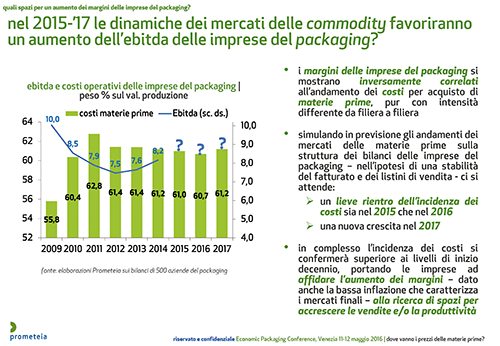 click to zoom the image
click to zoom the image
The world economy is going through a transitional phase, with contrasting trends. In short, we are experiencing a situation where even the experts can no longer make head or tail of things.
In 2015 the prices of many commodities racked back 10 years, aided by the cooling of growth in emerging economies, but since February this year commodity prices have shown a rebound, driven by the new orientation towards growth of Chinese economic policy.
However, it is unlikely that this trend will be consolidated, as Alessandra Benedini (Prometeia) clearly stated, explaining in detail data and charts that mercilessly register a high and not very reassuring volatility. In 2016 in fact the world GDP should, grow less than 3%, the value of the dollar will remain at high levels and commodity prices fall further.
As for the packaging, the prices for plastics, aluminium and, to a lesser extent, steel and cellulose are expected to decline. Hence: to increase margins, set against a slight drop in costs, in 2016, companies in the industry should aim to find new areas to increase sales and/or productivity.
The confirmation that we mortals, not gods, play a game where the rules are dictated by others, comes from our fine Pinuccia Parini (Aletti Gestielle Sgs). Just to dot one’s "i’s", China is worth 16% of world GDP, India 3% (only!), the same as France, Italy 2%, on a level with Brazil.
Hence it is easy to understand the reflections of the Chinese economy on the world market (more in the Asia - Pacific region), but reading of how the country is changing is far from obvious, that this year shows growth starting at just over 6%, in a context, however, where the industrial activity is weakening, while the importance of the service sector is rising.
As Parini noted, everything will depend on the holding of managerial class and its ability to manage the adjustment process started in 2014, and on continuing along the path of reform.
More care for detail
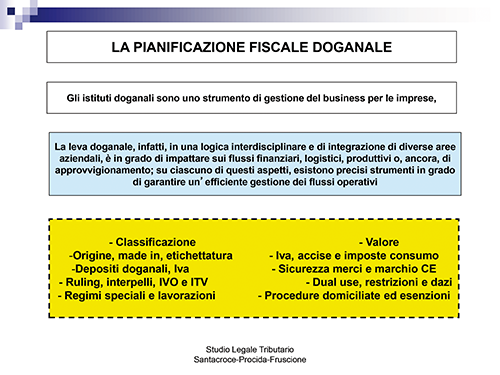 click to zoom the image
click to zoom the image
With the last three presentations, the conversation returned to the domestic front. And important matters they are from any but the most superficial perspective.
The fact, for example, that the European customs system underwent changes in May 2016 carries a significant impact, one in all likelihood thus far underestimated, not only on operators specialized in the logistics chain, but also on enterprises. Benedetto Santacroce (of the tax consulting firm Santacroce, Procida and Fruscione) masterfully laid out the perilous situation, stressing the importance of AEO (Authorized Economic Operator) certification, which is necessary in order to access the new customs system, as well as new terminology in classification, value and product origin arising not only from new customs and tax requirements, but also from the demands of the market itself.
Federico Strada (DLA Piper) discussed employee welfare and the potential advantages to concerns and workers made possible by current tax law as it incorporates the provisions of the 2016 stability law. Under the new regime, employee welfare is no longer understood as a “voluntary and unilateral act on the part of the employer” but potentially a second level collective agreement, without foregoing tax incentives.
According to Falasca this represents a significant step forward, but, he stipulates, in order to better promote employee welfare further changes to the law are necessary. The changes are an improvement, to be sure, but still too rigid. Also necessary are new industrial relations and, last but not least, a different mindset and culture among workers, because it can be a winning alternative only if it is properly understood.
We have stated the necessity of looking beyond the horizon, and we heard it vigorously echoed in the closing remarks delivered by Innocenzo Cipolletta (president of AIFI - the Italian Association of Private Equity, Venture Capital and Private Debt), who insisted on the importance of investing in startups, which is to say investing in the future.
In the age of globalization, new enterprises are not borne from the ranks of concerns, but rather from finance and research. This is shown by how, thanks to venture capital, early stage investments grew in 2015 both in terms of the number of transactions (122) and by the total amount invested (74 million euro). In other words, this is finance that bets on innovation by distributing risk in an investment portfolio in the awareness of the returns made possible by successful startup enterprises.
Traditional concerns themselves are turning to this market in order to reinvent products, processes and organizational models, moving beyond the logic of mere incremental innovation.
Unfortunately, even though Italy is a nation of entrepreneurs, we are lagging far behind other European countries in the number of venture capital-financed companies, but things appear to be changing thanks in part by the role in venture capital played by the Fondo Italiano d'Investimento SGR S.p.A. At this point there’s nothing more to do than to visit the official website www.ventureup.it and take part... in the future.
Until next time at the Economic Packaging Conference... which, I’m told, as always, is set to be the best yet.

